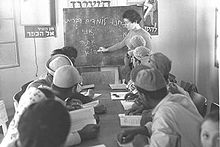- Ulpan
-
An ulpan is an institute or school for the intensive study of Hebrew. Ulpan (אולפן, plural ulpanim - אולפנים) is a Hebrew word meaning basically studio or teaching, instruction.
The ulpan is designed to teach adult immigrants to Israel the basic language skills of conversation, writing and comprehension. Most ulpanim also provide instruction in the fundamentals of Israeli culture, history, and geography. The primary purpose of the ulpan is to help new citizens to be integrated as quickly and as easily as possible into the social, cultural and economic life of their new country.
 Ulpan in Dimona, 1955
Ulpan in Dimona, 1955
Contents
History of the ulpan
The concept of the ulpan was initiated soon after the creation of Israel in 1948. The new country was faced with a massive influx of new immigrants, refugees from war-torn Europe, oppressed and disadvantaged communities from Africa and the Middle East, and others from all parts of the world. Although all were recognized as Jewish, their language and culture varied widely. Attendance at an ulpan and learning the Hebrew language served as a common bond that helped to develop a shared identity and sense of statehood.
The modern ulpan
The institution of the ulpan continues to serve immigrants today. There are numerous private facilities but the majority are run by the Jewish Agency, municipalities, kibbutzim, and the universities. Ulpanim are offered free to new olim to Israel. Many are equipped with modern audio-visual teaching aids. Since the establishment of the first ulpan in Jerusalem in 1949, more than 1.3 million new immigrants have graduated from ulpanim.
In recognition of its innovative culture-based approach to language teaching, the ulpan framework has been adopted by other nations attempting to revive their own declining or lost languages. Wales, Azerbaijan, Brittany, Catalonia, New Zealand and Scotland have used the ulpan model for native language instruction. Certain language courses in Wales and Scotland have even retained the name ulpan (spelled "Wlpan" in Welsh and Ùlpan in Scottish Gaelic).
Kibbutz ulpan
A number of kibbutzim across Israel also offer Ulpan courses. The course typically lasts 5 months and the Ulpanists will usually work part-time on the kibbutz (either 4 hours a day or 8 hours every other day, depending on the kibbutz) in addition to their studies. This is a particularly attractive option for younger immigrants or tourists.
Participants have the option of choosing kibbutz ulpan programs either on secular kibbutzim or on religious kibbutzim through Hakibbutz Hadati (Religious kibbutz) movement.
The online ulpan
In recent years the technology has introduced the needs for an up-to-date ulpan, those needs have been filled up by a few private companies such as Ulpanet, there are different methods of Hebrew E-learning such as synchronized and unsynchronized.
Crisis in the ulpan system
The teaching of Hebrew in Israel is in a crisis. A government study has shown that even after five months of intensive Hebrew study at ulpan, sixty percent of new immigrants over the age of thirty cannot read, write or speak Hebrew at a minimum level. The situation amongst the Russian immigrant population is even more dire with seventy percent of immigrants not being able to understand the Hebrew television news.[1]
As a result of this study, the Knesset has set up an inter-ministerial committee to study the situation and make recommendations to improve and change the ulpan system. Several alternative teaching systems are being considered for use in the ulpan framework. Amongst them is a system of accelerated learning for Hebrew.[2] Starting in 2004 many ulpans were closed on account of budget cuts by the Jewish Agency.[citation needed]
References
External links
- General Ulpan Information, Homestay program in Israel
- General Ulpan Information, Ulpans in Jerusalem
- Kibbutz Ulpan Information, Ulpan in Kibbutz Maagan Michael
- The Hebrew Language and Ulpanim
Hebrew · עִבְרִית Overviews 
Eras Dialects Israelian · JudahiteReading traditions Orthography ErasBiblical · Mishnaic · ModernScriptsPhonology Grammar Biblical · Modern
Verbal morphology · Semitic roots · Prefixes · Suffixes · Segolate · Waw-consecutiveAcademic Revival · Academy · Study · Ulpan · Keyboard · Hebrew / Israeli literature · Names · Surnames · Unicode and HTMLWikipedia policy IPA · Naming conventionsCategories:- Hebrew language
- Language schools
Wikimedia Foundation. 2010.
